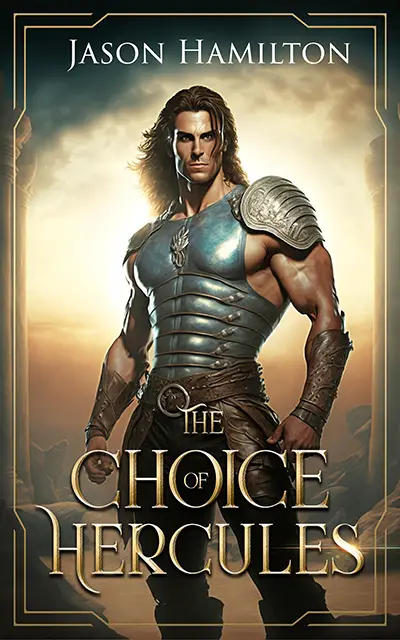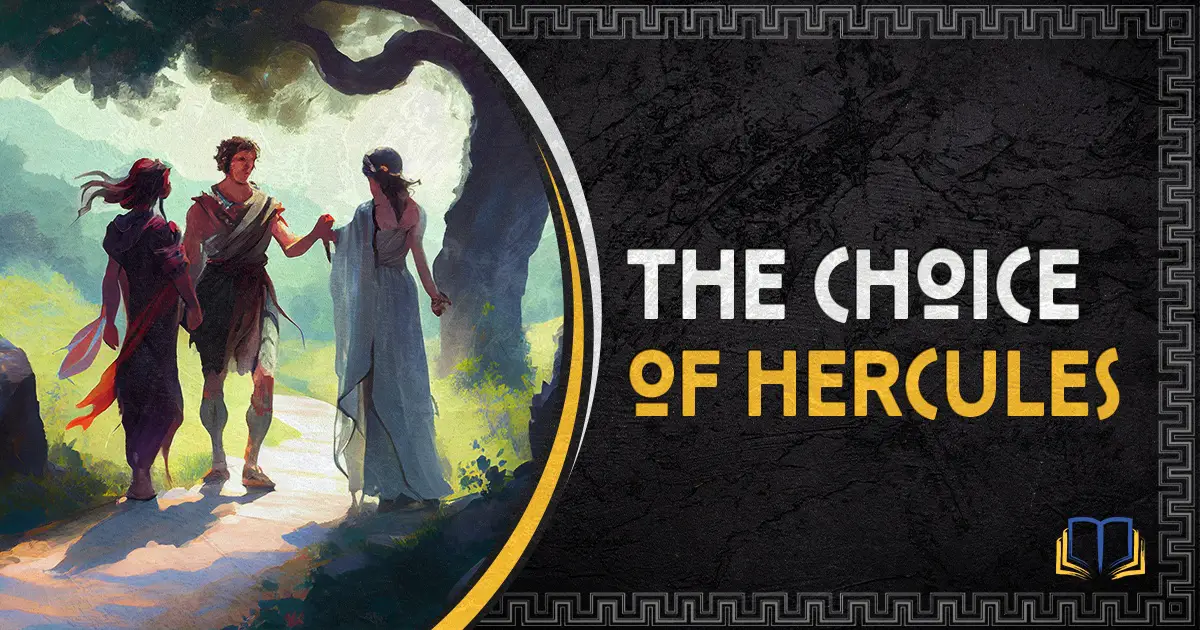Have you ever found yourself at a crossroads, unsure of which path to take? The ancient story of The Choice of Hercules speaks to this universal experience, offering wisdom and guidance on how to navigate the difficult decisions we all face.
In this tale, Hercules is presented with a choice between two paths, one representing Virtue and the other representing Vice. One path offers ease and pleasure, while the other requires hard work and dedication.
So which one will Hercules choose?
We’ll find out in this article.
Also don’t forget to check out our Greek Mythology hub for all things related to Greek Mythology.
The Story at the Crossroads
Hercules was at a crossroads, literally and figuratively.
He was a young man, considering which career path to take and was contemplating his options.
As he stood there, two beautiful women approached him.
- Arete: A minor goddess who represented Happiness or Virtue.
- Kakia: Another minor goddess who represented Pleasure or Vice.
Arete explained that she could offer a life of ease and sensory pleasure, but warned that this came at the cost of care, pain, and business.
Kakia, on the other hand, offered a life of ease and immediate gratification. However, she warned that these pleasures were short-lived and unfulfilling.
Arete advised that true happiness could only be achieved through hard work and the pursuit of noble goals. Kakia argued that her path was the easier and more enjoyable option.
So does Hercules choose Vice or Virtue?
In the end, Hercules made the difficult choice to follow Arete and pursue a virtuous and fulfilling life. He understood that the path to true happiness was not always easy, but it was worth the effort.
The Origin of the Story
The story of The Choice of Hercules, also known as Hercules at the crossroads, appears in the work of Xenophon, a famous ancient Greek historian and student of the philosopher Socrates.
In this text, called Memorabilia, the parable features the personifications of Vice and Virtue, depicted as two women offering Hercules a choice between two different paths in life.
The path offered by Vice is described as pleasant and easy, while the path offered by Virtue is described as severe but glorious.
The motif of a contest in dialogue between Vice and Virtue, in which the virtues of each path are presented and debated, appears in other works by ancient Greek and Roman writers.
This literary device, in which characters engage in a discussion or debate, is common in ancient Greek literature.
Since the origin of this story comes from Socrates through Xenophon, we can possibly assume that the story was made up by the philosopher to prove a point, though we cannot be certain of any such assumptions.
The Evolution of the Story
The story has been popular throughout history. It was particularly popular during the Renaissance period, as well as in Baroque and Neoclassical culture.
This story is part of the larger theme of psychomachia, or the battle of spirits or soul war.
The Renaissance scholar and poet Petrarch wrote about this story in his work De vita solitaria, focusing on the choice between a contemplative life and an active life.
The story has also been depicted in various works of art, such as paintings and prints, including the following:
- Hercules at the Crossroads (1498) by Albrecht Dürer
- Allegory of Virtue and Vice (1565) by Paolo Veronese
- The Choice of Hercules (1596) by Annibale Carracci
- Hercules between Virtue and Vice (1685) by Gerard de Lairesse
- Hercules between Virtue and Vice (1765–66) by Mariano Salvador Maella
John Adams, one of the Founding Fathers of the United States, was particularly inspired by this story and even wanted to use an illustration of it as the design for the Great Seal of the new nation.
Self-Improvement Applications
The story of Hercules standing at a crossroads and being presented with a choice between two paths, one representing Virtue and the other representing Vice, has remained popular and continues to be relevant in modern times.
The themes and moral lessons of the story, such as the importance of making deliberate and thoughtful choices, the need for self-reflection, and the value of pursuing a virtuous and fulfilling life, continue to resonate with people today.
The allegory is powerful because it illustrates the idea that true happiness and growth cannot be achieved without intense effort and personal, virtuous standards, and that there are always both positive and negative aspects to life.
As a result, the story is often used in self-improvement circles as a way to encourage people to consider the long-term consequences of their actions and to strive for personal growth and excellence. It serves as a reminder that we must be proactive in our pursuit of a meaningful and fulfilling life.
Arete is how we flourish in our own lives.
Common Questions
When was the Choice of Hercules written?
The Choice of Hercules appeared in Memorabilia, which was probably written around 371 BCE, since it makes reference to the Spartan defeat at the Battle of Leuctra, which happened that year.
Why did Hercules choose Virtue?
Ultimately, Hercules chooses the path of virtue, represented by Arete. This decision is often seen as a representation of the struggle between our base desires and our higher virtues. By choosing the path of virtue, Hercules demonstrated his commitment to living a moral and upright life, even in the face of temptation.
Was Hercules Virtuous?
Given the story of The Choice of Hercules, we can infer that Hercules did indeed live a virtuous life. However, this is just one story among many, all of which have been told from multiple perspectives throughout the years. Hercules was revered by many, but some of his exploits might come off as a little less virtuous in today’s society.
Final Thoughts
The story of The Choice of Hercules serves as a reminder that the path to true happiness and fulfillment requires effort and dedication. It encourages us to be proactive in our pursuit of a meaningful life and to make deliberate and thoughtful choices.
Whether we are faced with a difficult decision or simply trying to navigate the ups and downs of everyday life, the timeless lessons of this enduring allegory can inspire and guide us towards personal growth and excellence.
This is why I wrote a short story all about this very story, as it is one of my absolute favorites. I didn’t even change the name: The Choice of Hercules.
You can check it out here for FREE!

This is a short story that takes place in Greek Mythology (and is part of my shared universe of mythic stories).
It’s a faithful adaptation of a little-known myth that is perhaps my favorite about Hercules. Check it out!


